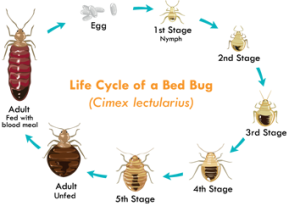Kings Bed Bug Pest Control Expert Cincinnati: Pro Pest Solutions
Kings Bed Bug Pest Control Expert Cincinnati: Pro Pest Solutions
Blog Article
A Break Down of the Various Kinds of Parasite Control Solutions
In the world of bug control, a wide range of techniques exist to address and combat the presence of undesirable animals. From the traditional use chemical pesticides to extra innovative organic control services, each approach provides distinct advantages and limitations. As we navigate via the diverse landscape of bug control solutions, comprehending the complexities of each approach comes to be extremely important in identifying the most effective strategy. Keep tuned as we explore the nuanced globe of bug control approaches and find how each kind plays a special role in protecting our settings.
Chemical Pesticides
Chemical pesticides are frequently used in bug control to properly remove a variety of bugs and various other bugs. These pesticides function by targeting the nerve system of the parasites, disrupting their normal functions, and eventually leading to their death. The usage of chemical pesticides has been a staple in the parasite control industry for years as a result of their performance and fast outcomes.

Nevertheless, it is essential to use chemical pesticides with care because of their potential damaging effects on the environment and non-target species. Inappropriate application or overuse of these pesticides can lead to air pollution, damage to advantageous bugs, and resistance advancement in bug populations. It is essential to comply with safety and security guidelines and guidelines when utilizing chemical pesticides for bug control.
Biological Control Methods
Considering the potential environmental effects and threats connected with chemical pesticides, organic control methods offer an even more lasting approach to taking care of insect populations. Organic control involves making use of natural enemies, such as bloodsuckers, predators, and pathogens, to subdue bug populations. This approach is commonly much more targeted, affecting just the certain parasite types while reducing harm to valuable insects, human beings, and the atmosphere.

As soon as developed, natural enemies can assist manage pest populations constantly without the need for duplicated applications of chemicals. In addition, organic control is frequently more cost-effective and can assist decrease chemical resistance in bug populaces over time.

Mechanical Bug Control
Mechanical parasite control includes the physical manipulation or elimination of pests to handle their populations successfully. This approach is usually employed in combination with various other pest control approaches for thorough bug administration. One common instance of mechanical parasite control is utilizing traps to catch pests or rats. These traps can be established in strategic locations where bugs are known to dwell, aiding to reduce their numbers.
One more mechanical approach is using barriers such as screens, internet, or fencings to obstruct insects from getting in particular areas. By literally preventing pests from accessing an area, the likelihood of infestations or damages can be dramatically minimized. In addition, hands-on methods like handpicking pests off structures or plants can be reliable for smaller-scale infestations.
While mechanical insect control techniques can be labor-intensive, they provide a non-chemical choice that can be sustainable and rodent exterminator ecologically pleasant. By targeting pests directly, mechanical control strategies can assist keep pest populaces in check without depending on chemicals.
Natural Treatments
Utilizing natural treatments for pest control provides a eco-friendly and lasting method to managing pest populations without turning to chemical treatments. Natural treatments involve using materials obtained from plants, minerals, or other naturally occurring resources to discourage or eliminate insects. Growing specific herbs this like basil, mint, or lavender around your residential property can fend off pests due to their solid fragrances. Diatomaceous planet, a powder made from fossilized algae, can be utilized to fight pests like ants, roaches, and bed bugs by dehydrating their exoskeletons.
In addition, vital oils such as tea tree oil or neem oil have insecticidal residential or commercial properties that can efficiently control insects while being secure for the environment. An additional all-natural remedy is introducing advantageous pests like ladybugs or hoping mantises to your garden to take advantage of dangerous bugs. By integrating these natural remedies right into insect monitoring methods, people can minimize their reliance on synthetic chemicals and promote a healthier, much more balanced environment.
Integrated Parasite Management
Integrated Pest Management (IPM) is a comprehensive strategy that integrates different methods to effectively regulate pest populations while minimizing threats to human health and the environment. IPM involves the integration of several parasite control approaches such as biological control, environment control, modification of cultural techniques, and the use of immune crop selections. By making use of a mix of these techniques, IPM intends to decrease dependence on chemical pesticides, which can have unfavorable influence on ecosystems and human health and wellness.
One secret facet of IPM is the emphasis on prevention. By carrying out actions to stop bug invasions prior to they occur, such as maintaining correct hygiene and sealing access points, the requirement for responsive insect control procedures is lessened. Surveillance and normal assessments play an important duty in IPM, permitting very early discovery of pest concerns and prompt treatment.
Conclusion
In conclusion, the various kinds of bug control solutions provide a range of alternatives for properly handling bug invasions. Biological control techniques use natural predators to regulate insects. Integrated Insect Administration combines several methods for an alternative check my source strategy to pest control.
Chemical chemicals are frequently used in parasite control to efficiently remove a wide variety of insects and various other bugs.Mechanical parasite control entails the physical manipulation or removal of insects to manage their populaces effectively (Kings best pest control cincinnati).Using all-natural remedies for pest control offers a environmentally friendly and lasting method to handling pest populations without resorting to chemical treatments.Integrated Parasite Administration (IPM) is an extensive strategy that integrates numerous methods to properly control pest populations while decreasing threats to human wellness and the atmosphere.In conclusion, the different kinds of bug control solutions use a range of options for successfully managing parasite infestations
Report this page